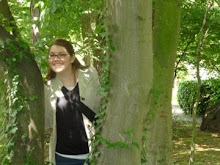For the "doing" part of the internet safety assignment I talked to my mom about Internet Safety.
Here are her thoughts about the Internet and how to use it safely:
What do you think of when I say internet safety:
• Identity Theft
o It is horrible.
o Personal experience, when purse was stolen, had remember last check I had
written. Was able to stop it. Police found purse.
o When they steal Social Security Number, hard to defend it.
o Don’t understand all the ways you can steal someone’s Identity. But it is bad.
o Credit can be affected, can run lives.
• Chat rooms: Go outside and meet a real person.
• SPAM: Hate it, get it all the time. Don’t know how I got on the list. (I then explained that sometimes if you reply to spam, and "unsubscribe", that they can sometimes get your
• Myspace: I think it is useful tool that can be misused by unsuspecting teens.
• Kids being stupid on Myspace, and giving away too much information and so forth.
o Don’t really know a lot about it.
• Facebook: It is awesome.
o Great social networking tool, without being stuck face to face.
• Cyber bullying: Think about the lady who impersonated a child, and said mean things about a teenager on myspace, that the teenager committed suicide.
• What prophets and apostles have said about it:
o Can be used for good or bad, Need to get rid of addictions.
• Do you feel the internet is addictive?
o Yes, have a hard time going to bed, well, I’ll just check my e-mail. Or playing s
spider solitaire.
• What did you do before the internet?
o I wrote letters, I called the operator, I used phonebooks, I had encyclopedias.
o Has society become lazier as a result of technological advances?
• Used to take children to library..research, now it’s all just clickty, click.
• I sure would hate to give it up.
• Text messaging:
o Think it is horrible and good at the same time.
• At schools, people used to talk to each other in the hallways, now it seems like everybody is buried in their phones, miss scenery.
Lack of Human interaction.
• Good way to send message quickly, and not interrupt people.
• Less intrusive someways.
• Twitter:
o Don’t understand the whole thing.
o Seems more inane, who cares?
o Facebook is more personal.
o Time waster. Not interacting with people.
• Overall, has technology has made our lives better?
o Yes.
• Do you think it has separated our families physically, mentally, emotionally?
o Not personally, but I can see how it might.
o Mentally: Socially Isolating. Spend hours online.
• Do you think that the popularity of video games has decreased with the expansion of the internet. (versus online gaming increasing)
o Yes, games are free online, you have to buy a gaming system…etc.
• Passwords: Do you know how to keep them safe?
• Not really (I then gave her some tips on how to make her password safe, like capitalizing, using numbers, and maybe using symbols.)

